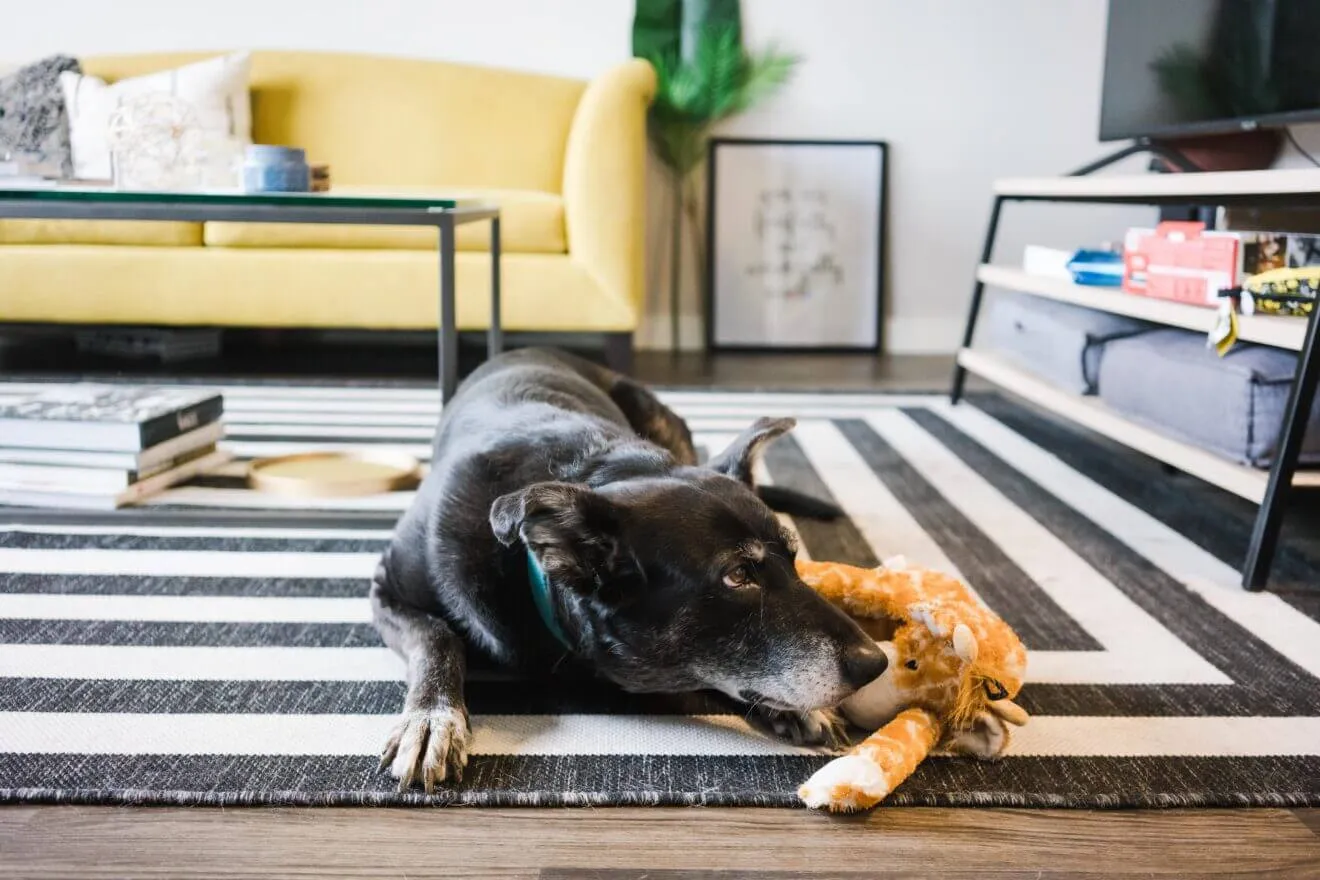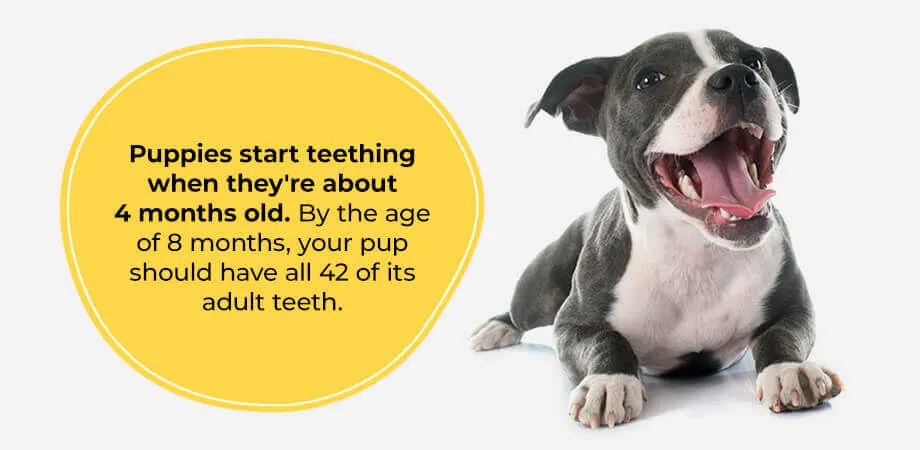Bringing a new puppy into your home is an incredibly joyful experience. Their playful antics and unwavering affection can brighten any day. However, along with the undeniable cuteness, new puppy parents often encounter a common challenge: destructive chewing. From curious nips at fingers and toes to the unfortunate destruction of your favorite footwear, a puppy’s urge to chew can be both frustrating and costly. This behavior is particularly prevalent during the teething phase, but it can stem from various other factors. The good news is that with the right approach and consistent training, you can effectively teach your furry friend to Stop A Dog From Chewing On Shoes and other inappropriate items, redirecting their natural instincts toward more suitable alternatives.
Understanding Puppy Teething and Destructive Chewing
Just like human babies, puppies go through a teething process. They are born with 28 tiny, needle-sharp deciduous (baby) teeth. Around 3 to 4 months of age, these baby teeth begin to fall out, making way for 42 permanent adult teeth. This transition can be quite uncomfortable, causing sore gums and a strong desire to chew anything and everything to relieve the pain and pressure. You might notice increased drooling or even tiny blood spots on their toys – these are normal signs of teething.
During this period, your puppy’s natural instinct to explore their environment also contributes to chewing. It’s how they learn about textures, tastes, and the world around them. Beyond teething, chewing also helps exercise their jaws, keeps their teeth clean, and can be a way to alleviate boredom, stress, or anxiety.
When your puppy starts showing signs of teething or excessive chewing, consider these proactive steps:
- Provide appropriate chew toys: Offer a variety of durable chew toys specifically designed for puppies.
- Offer soothing options: Choose toys that can be filled with cool water and frozen, or those designed to be chilled. The cold can help soothe inflamed gums.
- Monitor toy condition: Regularly check your puppy’s toys for signs of wear and tear, replacing them if they become shredded or could pose a choking hazard.
- Interrupt unwanted chewing: If your puppy bites you or chews something inappropriate, make a sharp, high-pitched noise (like “ouch!”) to startle them and signal that the behavior is unwelcome.
- Reward positive redirection: Immediately reward your puppy with praise, affection, or a small treat any time they stop nipping at you or forbidden items and instead pick up one of their designated chew toys.
- Seek veterinary advice: If you notice unusual behavior, excessive aggression during play, or have concerns about their teething process, consult your veterinarian. Early intervention can often prevent more serious help with dog behavior problems down the line.
Effective Strategies to Stop a Dog from Chewing on Shoes
Successfully training your dog to ignore your footwear and other household items requires consistency, management, and positive reinforcement. Hormonal changes during puppyhood can intensify the urge to chew, making proactive strategies essential. If you’re wondering how to keep puppies from chewing your belongings, especially those coveted shoes, try these proven methods:
- Abundance of approved chew toys: Ensure your puppy always has access to a wide selection of appealing chew toys. Rotate them regularly to keep them interesting.
- Teach “mine” vs. “yours”: Actively teach your puppy what is acceptable to chew and what is not. When they chew on their toys, praise them enthusiastically. If they go for a shoe, redirect them immediately to an appropriate toy.
- Invest in durable, interesting toys: Look for toys made of hard nylon or other resilient materials that can withstand vigorous chewing. Some even have compartments for treats or can be frozen for extra relief.
- Embrace positive reinforcement: Never strike or scold your puppy harshly when you catch them chewing on your things. This can instill fear and might make them chew more secretly. Instead, use rewards and positive reinforcement to praise and encourage chewing on their own toys.
- Ensure a balanced diet: Feed your puppy high-quality, nutritionally complete puppy food. Sometimes, chewing can be a sign of nutritional deficiencies or hunger.
- Manage their environment: This is crucial. Until your puppy fully understands what they can and cannot chew, keep all shoes, children’s toys, books, remote controls, and other valuable or dangerous items out of their reach. Crate training or using a puppy playpen can be invaluable tools for management when you can’t supervise directly.
 Content black and white dog happily chewing on a designated toy, avoiding shoes
Content black and white dog happily chewing on a designated toy, avoiding shoes
Common Mistakes to Avoid When Your Dog Chews
When dealing with a teething puppy or one prone to destructive chewing, certain common mistakes can inadvertently exacerbate the problem. It’s vital to communicate clearly and consistently. For instance, punishing your dog for chewing one specific shoe doesn’t necessarily teach them that all shoes are off-limits. Here are a few “don’ts” to keep in mind when your dog’s chewing habits challenge you:
- Avoid offering “old” off-limits items as toys: A significant error is giving your puppy an old shoe, sock, or worn-out piece of clothing to chew on. This sends a confusing message, as your puppy cannot differentiate between “old” shoes and your brand-new sneakers. They’ll likely struggle to understand why some shoes are acceptable and others lead to punishment. Only provide toys that are distinct from household items you want them to leave alone. This is especially true for puppies with a history of puppy mill dog behavior problems, who may already have difficulty with boundaries and appropriate play.
- Steer clear of rawhide treats: While popular, rawhide treats are generally not recommended. They are difficult for dogs to digest, pose a high choking risk, and can lead to dangerous intestinal blockages. Opt instead for durable, safe chew toys, natural chews like turkey tendon, or interactive puzzle feeders that dispense treats.
Why Your Dog Might Still Be Chewing Shoes
While chewing is a normal exploratory and discomfort-relieving behavior for puppies, persistent or excessive chewing—especially into adulthood—can indicate underlying issues. If your dog continues to chew destructively, particularly on items like shoes, it might be due to one of these common problems:
Separation Anxiety
If you observe that your dog tends to chew excessively when left alone, or when you’re preparing to leave, separation anxiety could be the culprit. This common condition affects many dogs and can manifest in various destructive behaviors, including inappropriate urination or defecation, excessive barking, pacing, and, of course, destructive chewing. Triggers can include sudden changes in schedule, moving to a new residence, or changes in household composition. Dogs adopted from shelters or those with a history of neglect or abuse may be more prone to separation anxiety.
To help your dog, try to create positive associations with being alone. Offer special, high-value treats or unique toys only when you leave, and remove them upon your return. Practice desensitization by performing “leaving cues” (like putting on your coat or picking up keys) without actually departing. Ensuring your dog receives ample mental stimulation and physical activity throughout the day can also reduce overall stress and excess energy, making them more relaxed when you’re away. If separation anxiety persists, consulting a vet or a certified professional dog trainer is advisable. Dogs with anxiety might also exhibit other compulsive behaviors, such as dog keeps licking and chewing paws.
Premature Weaning
Weaning is the gradual process where a puppy transitions from its mother’s milk to solid food, typically over several weeks. During this crucial period, puppies learn vital survival skills, social cues, and appropriate bite inhibition from their mother and littermates. If a puppy is weaned too early or too quickly, it can lead to various behavioral problems that extend into adulthood, including:
- Aggression
- Possessiveness over resources
- Separation anxiety
- Excessive or rough play
- Biting without proper inhibition
- Destructive chewing
If you suspect your dog was weaned prematurely, it’s essential to take action. Consult your veterinarian for guidance, and they might recommend professional puppy behavior training near me to help address these ingrained behavioral challenges. Socializing your puppy with other well-adjusted dogs and puppies can also aid in teaching proper social behaviors.
Hunger or Nutritional Deficiencies
Sometimes, dogs chew simply because they are hungry or not receiving adequate nutrition. If your dog is on a calorie-restricted diet, they might resort to chewing objects in hopes of finding additional food sources. In such cases, they often target items that smell like food or remind them of it. If you suspect this is the cause, discuss your dog’s diet with your veterinarian. They can help determine if a dietary supplement or adjustment is needed. Offering strong-smelling, food-dispensing puzzle toys can also help satisfy their oral fixation and provide mental stimulation.
 Infographic detailing the typical duration of puppy teething phases
Infographic detailing the typical duration of puppy teething phases
How Long Does Puppy Chewing Last?
The most intense period of puppy chewing, driven by teething, typically begins when they are around 4 months old. By the age of 8 months, most puppies will have all 42 of their adult teeth. This means the primary teething phase, with its associated chewing, generally lasts for about 3 to 4 months. While adult dogs can still enjoy chewing, the frantic, indiscriminate chewing often subsides once teething is complete, especially if good habits have been established early. Understanding 4 month old lab puppy behavior can give you insights into their developmental stage.
When to Seek Professional Help for Chewing
Despite your best efforts and precautions, a determined puppy might still chew something potentially dangerous or valuable. Proactive measures are always best: keeping a watchful eye on your puppy, using crates or pens when supervision isn’t possible, offering plenty of engaging chew toys, and securing hazardous objects out of reach.
However, if you suspect your dog has chewed and ingested something it shouldn’t have, or if their destructive chewing persists despite consistent training and management, it’s crucial to seek professional help. Excessive or anxious chewing can escalate and cause significant health risks or damage. A professional dog trainer or veterinary behaviorist can provide tailored strategies and identify underlying issues that contribute to the behavior.
Nurturing a Well-Behaved Companion with Dog Care Story
Understanding and managing your dog’s chewing habits, especially the tendency to stop a dog from chewing on shoes, is a fundamental part of responsible pet ownership. By providing appropriate outlets, consistent training, and addressing any underlying behavioral issues, you can guide your dog toward becoming a well-behaved and cherished member of your family. If you need further guidance on puppy training, behavioral issues, or general dog care, Dog Care Story is here to support you every step of the way.
